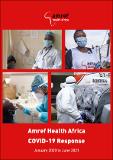| dc.description.abstract | COVID-19 was declared a global pandemic by the WHO in March 2020. At the same time, many
African countries started to report their first COVID-19 cases, and by end of August 2021, there were
215 million confirmed COVID-19 cases and close to 4.5 million deaths globally. Africa has recorded
at least 6 million confirmed cases and 140,000 deaths so far. These numbers do not tell the full story
of COVID-19’s disruption of health services delivery, economic growth prospects and general livelihood.
According to the Economic Commission for Africa, between five million and 29 million people in Africa are
predicted to be pushed into extreme poverty due to the impact of COVID-19. If the impact of the pandemic
is not limited by 2021, an additional 59 million people could suffer the same fate.
Guided by three principal objectives, Amref’s response focused on preventing transmission, preventing
death, and preventing social harm. Under these pillars, Amref’s approach has been rooted firmly in
community engagement and awareness-raising, delivered through an extensive network of Community
Health Workers (CHWs). In addition, long-established, robust relationships have enabled Amref to advise
on policy and strategic directions at the global, regional and national levels. Amref has addressed both the
immediate and the longer term impacts of COVID-19, considering the potential long-term effects on other
structural health system concerns, as well as the wider social and psychological impacts, stifled youth
opportunities, and increased rates of gender-based violence (GBV).
Amref’s COVID-19 response started in mid-March 2020, four days after the first case was detected in
Kenya and on the same day as Tanzania’s first case. The response in 10 East, Southern and Western Africa
countries has delivered significant results. Almost 30 COVID-19 specific projects have been rolled out in
communities and reprogramming has enabled another 45 ongoing projects to incorporate COVID-19 into
their routine implementation plans. 10 million young people have been reached with demand creation
messages. 5.4 million people1 in Africa have been reached with infection prevention and control measures
and 250,000 health workers have been trained in COVID-19 response interventions across the continent.
Digital technology has enabled Amref to reach beneficiaries on a significant scale across multiple
locations. Carrying out many multi-media, and Behaviour Change Communication (BCC) campaigns,
Amref has reached more than 15 million people, including young people. Critical interventions such as the
development of communications in sign language and braille, and support to ensure good mental health,
have helped to ensure that no one has been left behind. Amref contributed to strengthening the overall
resilience of health systems through laboratory testing and diagnostic systems, and has continued to deliver
essential health services to women and children through ongoing programmes. Amref’s involvement in the
response included medical evacuations during emergencies. Amref Flying Doctors has provided critical
medical transfers for more than 400 patients to Nairobi, including those from as far away as Afghanistan,
Senegal and Yemen
Throughout the pandemic, Amref conducted extensive research and analysis on the changing dynamics of
the disease in communities, including recent developments such as vaccine hesitancy in Kenya. Building
on this experience and knowledge, Amref was recognised as a thought leader and added its voice to
meaningful advocacy – whether on global media outlets such as CNN or in advocating internationally for
vaccine equity and increased vaccine supply.
All of Amref’s COVID-19 responses and results would not of course have been possible without the support
of many highly-valued partners and collaborators, as well as the tireless efforts and determination of
Amref’s staff around the world who helped enhance capacities in the response and continue to provide
essential support millions of people across Africa. | en_US |

